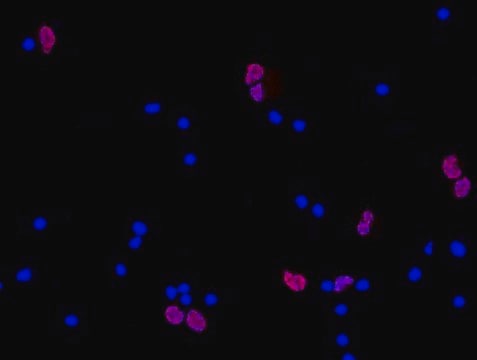MABN50A4
抗-Olig2抗体,克隆211F1.1,Alexa Fluor™488结合物|MABN50A4
clone 211F1.1, from mouse, ALEXA FLUOR™ 488
同義詞:
Oligodendrocyte transcription factor 2, Oligo2, Class B basic helix-loop-helix protein 1, bHLHb1, Class E basic helix-loop-helix protein 19, bHLHe19, Protein kinase C-binding protein 2, Protein kinase C-binding protein RACK17
登入查看組織和合約定價
全部照片(1)
About This Item
分類程式碼代碼:
12352203
eCl@ss:
32160702
NACRES:
NA.41
推薦產品
生物源
mouse
品質等級
共軛
ALEXA FLUOR™ 488
抗體表格
purified immunoglobulin
抗體產品種類
primary antibodies
無性繁殖
211F1.1, monoclonal
物種活性
rat, mouse
物種活性(以同源性預測)
human (based on 100% sequence homology)
技術
immunocytochemistry: suitable
同型
IgG2a
NCBI登錄號
UniProt登錄號
運輸包裝
wet ice
目標翻譯後修改
unmodified
基因資訊
human ... OLIG2(10215)
一般說明
少突胶质细胞谱系转录因子2(Olig2)是属于碱性螺旋-环-螺旋转录因子(bHLH)OLIG家族A组的蛋白质。bHLH蛋白分为6组(A-F),并通过其生化特性和结构进行表征。Olig2由于具有与其他bHLH蛋白形成异二聚体并与E盒结合的能力而被分类为A组。Olig2在发育过程中在确定运动神经元和少突胶质细胞在脊髓中的最终位置以及体细胞运动神经元在后脑内的发育中起着至关重要的作用。在少突胶质细胞和发育中的星形胶质细胞中观察到Olig2表达。最近的研究表明,Olig2在人少突胶质细胞瘤、中枢神经系统内的原发性肿瘤中高表达,在星形细胞瘤中呈中等表达。这些观察结果使得Olig2可能具有作为少突胶质细胞瘤诊断标志物的潜力。
免疫原
对应于人Olig2的重组蛋白。
應用
研究子类别
发育神经科学
发育神经科学
研究类别
神经科学
神经科学
品質
通过免疫细胞化学在大鼠少突胶质前体细胞中进行评估。
免疫细胞化学分析:该抗体以1:100稀释度在大鼠少突胶质前体细胞中检测到Olig2。
免疫细胞化学分析:该抗体以1:100稀释度在大鼠少突胶质前体细胞中检测到Olig2。
標靶描述
未偶联的亲本抗体(目录号MABN50)的分子量约为37 kDa
外觀
纯化的小鼠单克隆IgG2a与Alexa Fluor™ 488偶联,溶于含0.1%叠氮化钠和15 mg/mL BSA的PBS中。
纯化蛋白G
儲存和穩定性
自接收之日起,以未稀释的等分试样在2-8°C下避光保存长达6个月。
分析報告
对照
大鼠少突胶质前体细胞
大鼠少突胶质前体细胞
法律資訊
ALEXA FLUOR is a trademark of Life Technologies
免責聲明
除非我们的目录或产品随附的其他公司文件中另有说明,否则我们的产品预期仅用于研究用途,不得用于任何其他目的,包括但不限于未经授权的商业用途、体外诊断用途、离体或体内治疗用途或对人类或动物的任何类型的消费或应用。
Not finding the right product?
Try our 產品選擇工具.
儲存類別代碼
12 - Non Combustible Liquids
水污染物質分類(WGK)
WGK 2
閃點(°F)
Not applicable
閃點(°C)
Not applicable
分析證明 (COA)
輸入產品批次/批號來搜索 分析證明 (COA)。在產品’s標籤上找到批次和批號,寫有 ‘Lot’或‘Batch’.。
Sofía Puvogel et al.
Molecular psychiatry (2022-10-04)
The midbrain is an extensively studied brain region in schizophrenia, in view of its reported dopamine pathophysiology and neuroimmune changes associated with this disease. Besides the dopaminergic system, the midbrain contains other cell types that may be involved in schizophrenia
Itzy E Morales Pantoja et al.
PloS one, 15(6), e0233980-e0233980 (2020-06-09)
Multiple sclerosis (MS) is an inflammatory and demyelinating disease of the central nervous system (CNS) that results in variable severities of neurodegeneration. The understanding of MS has been limited by the inaccessibility of the affected cells and the lengthy timeframe
Emma Gerrits et al.
Acta neuropathologica, 141(5), 681-696 (2021-02-21)
Alzheimer's disease (AD) is the most prevalent form of dementia and is characterized by abnormal extracellular aggregates of amyloid-β and intraneuronal hyperphosphorylated tau tangles and neuropil threads. Microglia, the tissue-resident macrophages of the central nervous system (CNS), are important for
Pavel Katsel et al.
NPJ schizophrenia, 5(1), 3-3 (2019-01-31)
Oligodendrocyte (OLG)-related abnormalities have been broadly observed in schizophrenia (SZ); however, the etiology of these abnormalities remains unknown. As SZ is broadly believed to be a developmental disorder, the etiology of the myelin abnormalities in SZ may be related to
Andy P Tsai et al.
Immunity, 56(9), 2121-2136 (2023-09-03)
Genetic association studies have demonstrated the critical involvement of the microglial immune response in Alzheimer's disease (AD) pathogenesis. Phospholipase C-gamma-2 (PLCG2) is selectively expressed by microglia and functions in many immune receptor signaling pathways. In AD, PLCG2 is induced uniquely
我們的科學家團隊在所有研究領域都有豐富的經驗,包括生命科學、材料科學、化學合成、色譜、分析等.
聯絡技術服務








